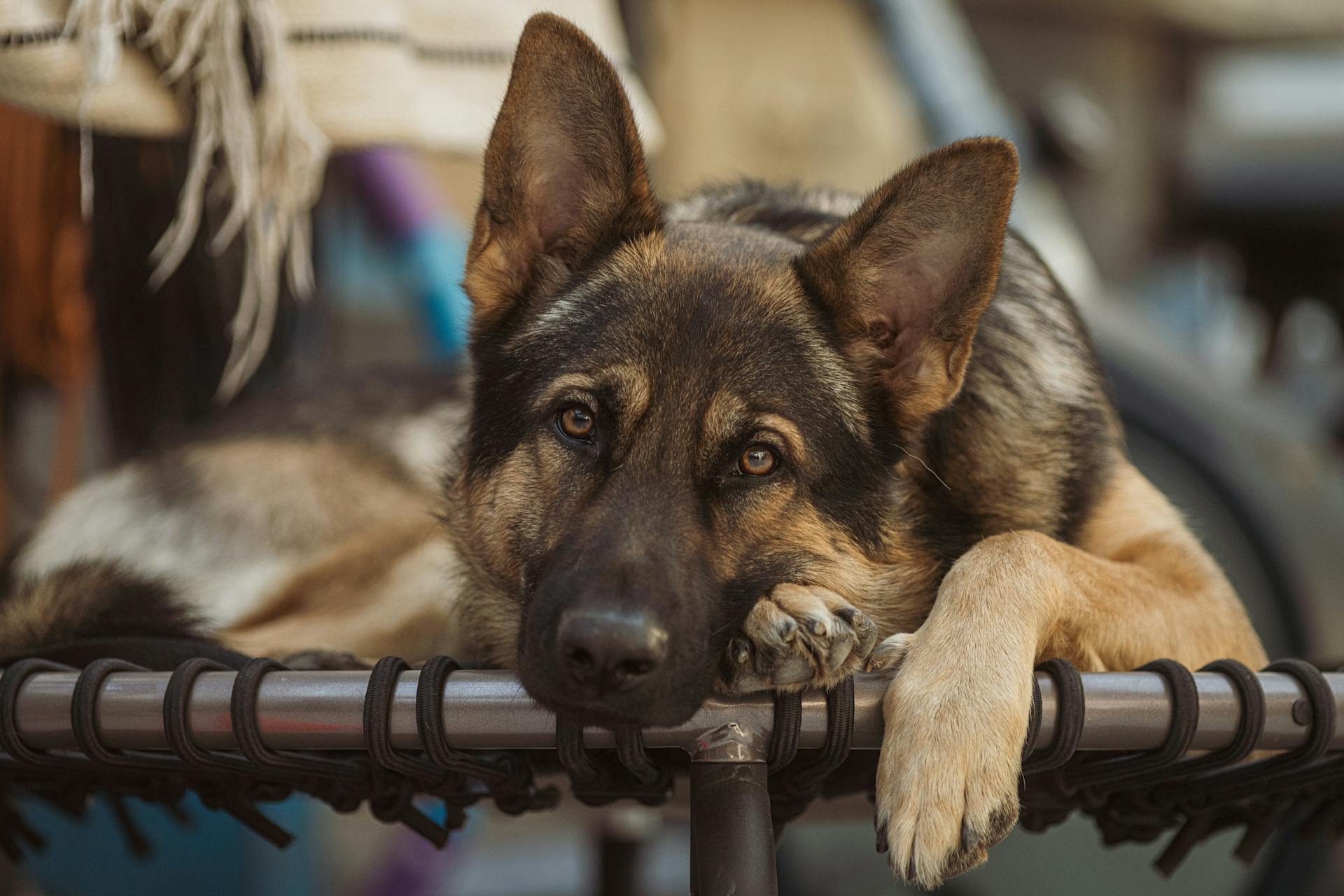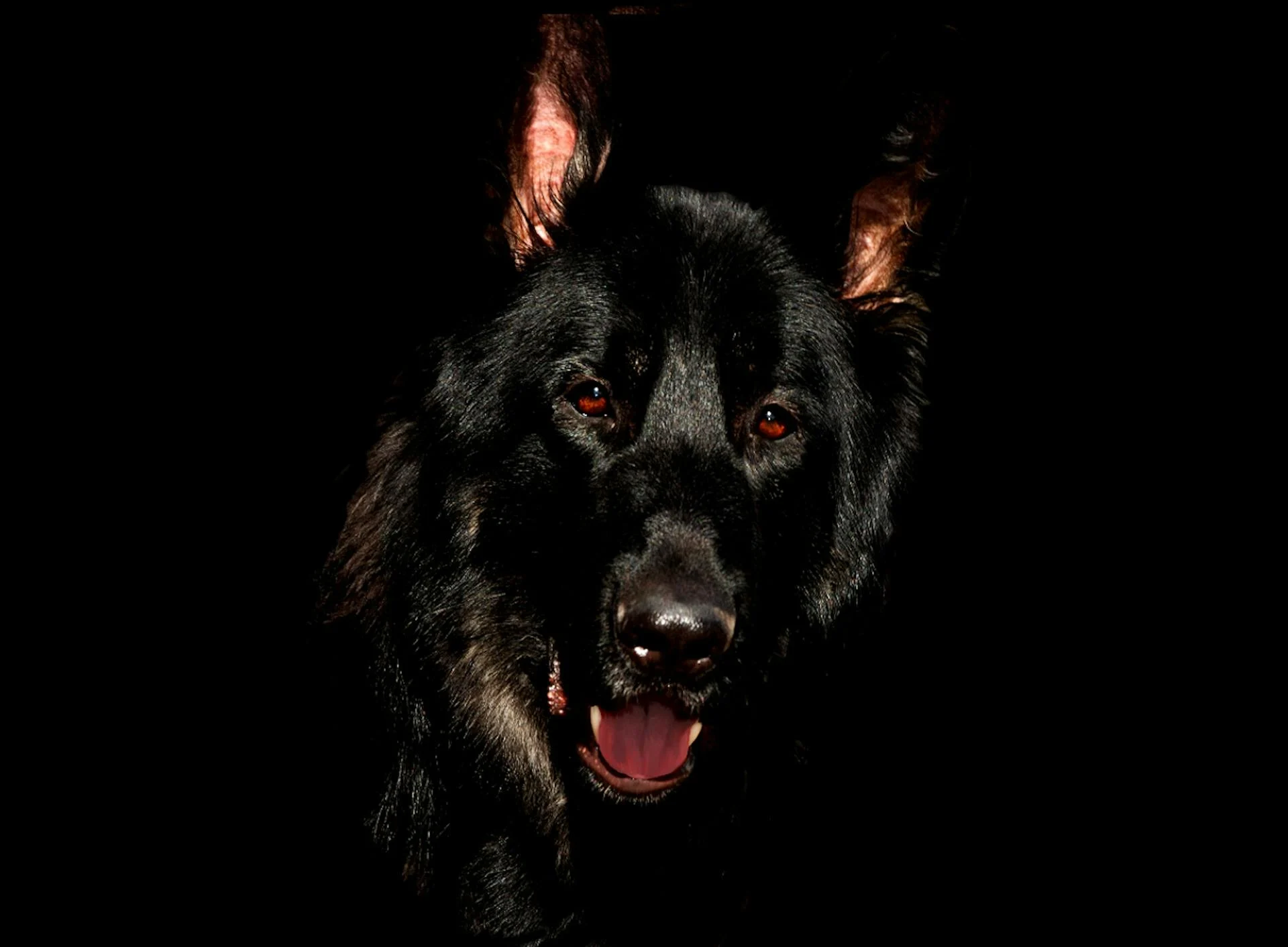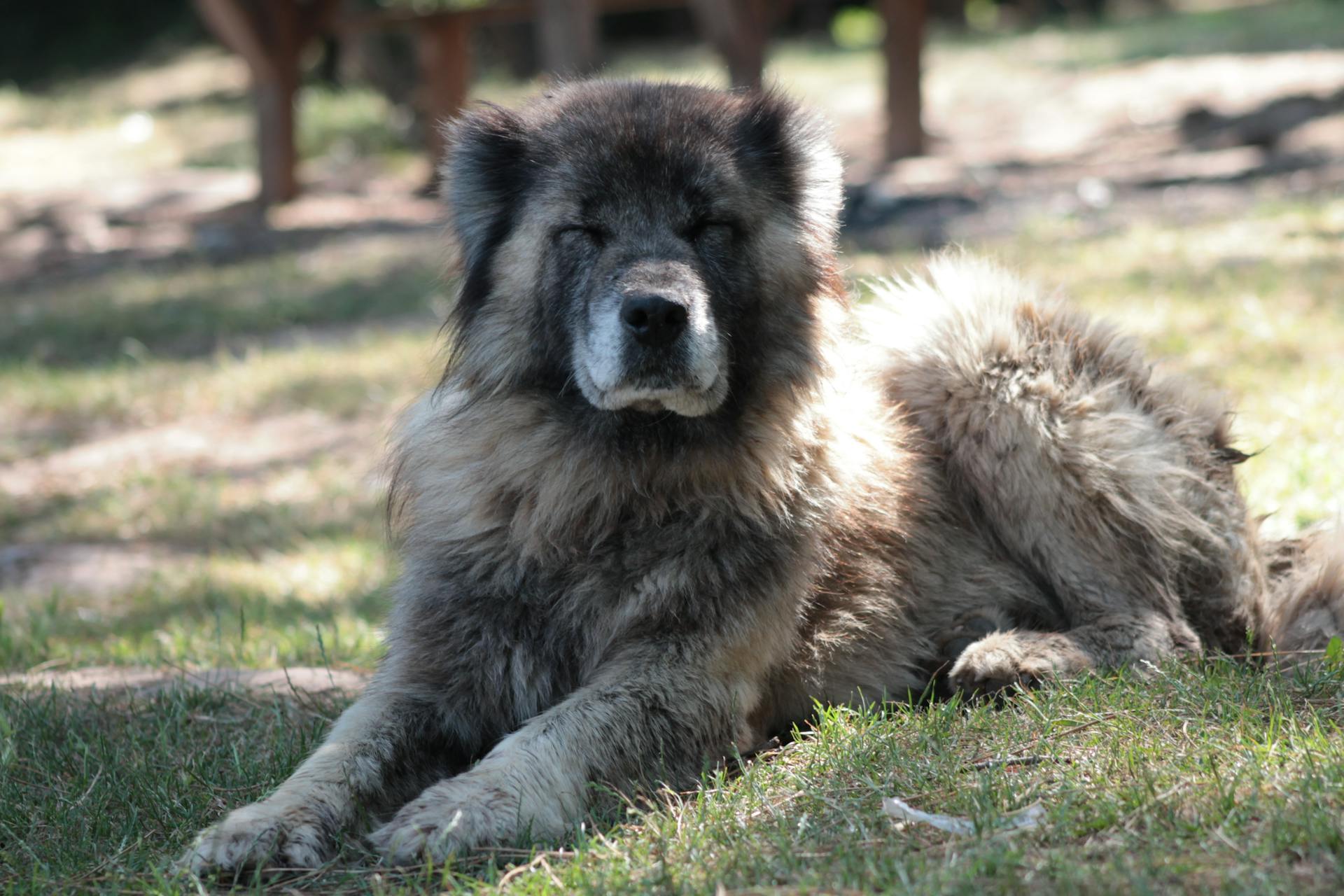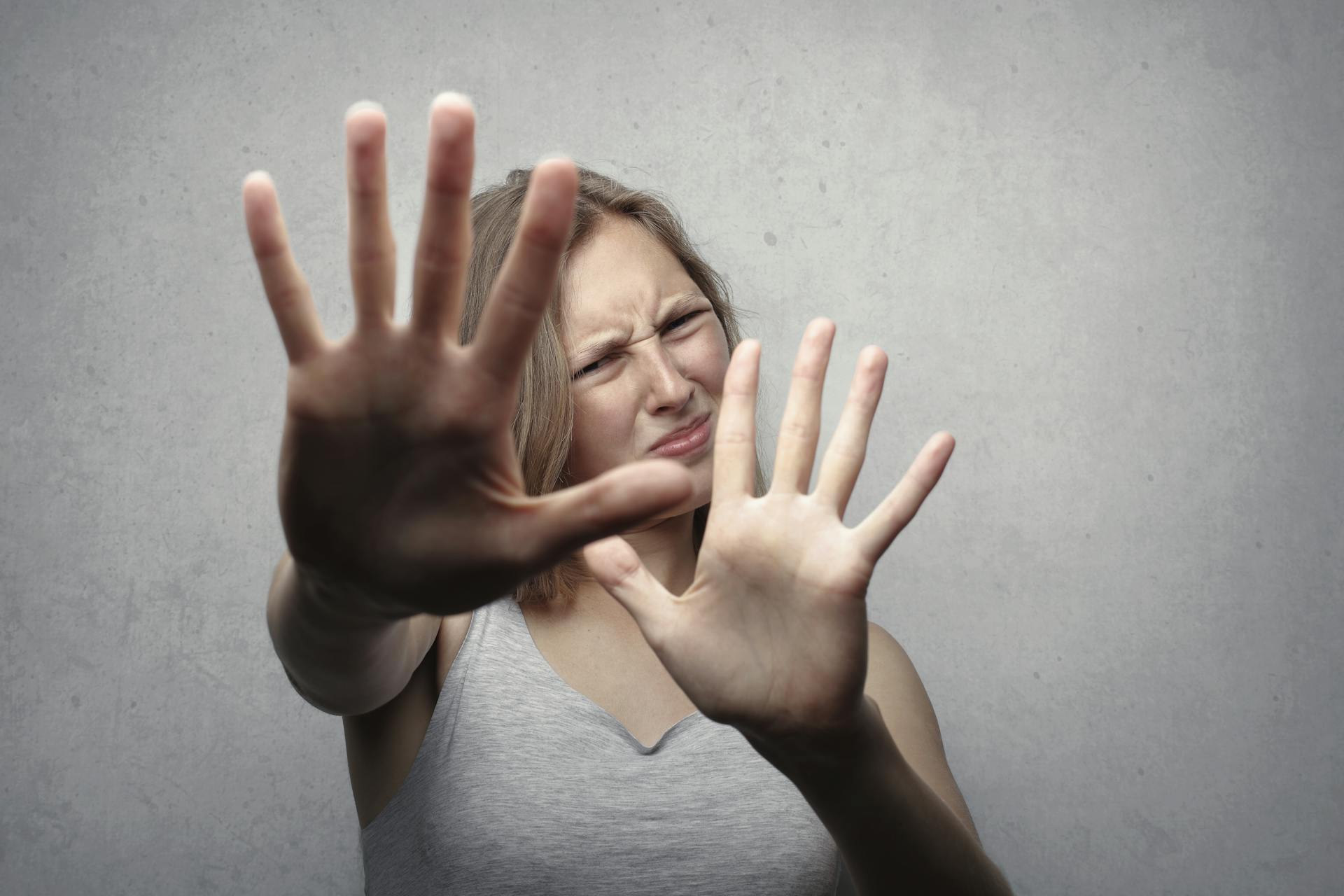
The Caucasian Shepherd is a majestic breed that requires attention to detail and a commitment to their well-being.
They are an ancient breed, with origins dating back over 2,000 years, making them one of the oldest dog breeds in existence.
To raise a healthy Caucasian Shepherd, it's essential to understand their unique needs and characteristics.
This breed is built for endurance and can thrive in harsh climates, but they still require regular exercise and mental stimulation to prevent boredom and obesity.
Dog Care and Nutrition
Caucasian Shepherds can grow to be massive dogs, with a minimum weight of 100 pounds and a maximum weight of 170 pounds.
They need plenty of space to live comfortably, so it's essential to have a home with ample room for them to roam around. Standing 23–30 inches tall, these large dogs require a lot of exercise and physical activity.
To ensure your Caucasian Shepherd gets the nutrition they need, choose a well-balanced dog food that follows the nutritional guidelines approved by the Association of American Feed Control Officials (AAFCO). Some good options include Royal Canin/MD, Hills, and Purina.
Dog Nutrition
Choosing the right dog food for your Caucasian Shepherd is crucial for their overall health and well-being.
A well-balanced dog food that follows the nutritional guidelines approved by the Association of American Feed Control Officials (AAFCO) is essential for your dog's growth and development, whether they're a puppy or an adult. Some go-to options include Royal Canin/MD, Hills, and Purina.
Feeding your Caucasian Shepherd puppy requires some extra attention, as they need to eat a puppy food specifically formulated for large-breed dogs to keep up with their rapid growth and development.
To ensure your dog is eating properly, it's recommended to feed them three to four small meals every day on a regular feeding schedule when they're a puppy. Once they reach adulthood, you can switch to twice per day.
For your interest: Bernese Mountain Dog Growth Chart
Lifetime Care Costs
The lifetime care cost of a dog can vary significantly depending on its breed and size.
A Caucasian shepherd's lifetime care cost is $11,621-$15,336+. This includes expenses such as food, vet bills, and supplies over the course of its lifespan.
Dogs require regular vaccinations, which can add up to around $1,000 or more per year.
Broaden your view: Bernese Mountain Dog Care
Health and Wellness
Caucasian Shepherds are generally a healthy breed, but their lifespan is relatively short compared to other breeds, with most living 10-12 years.
Some health issues that can affect Caucasian Shepherds include hip dysplasia, heart problems, cataracts, and entropion. These conditions can be genetic in nature, meaning they're more common in this breed than others.
To keep your Caucasian Shepherd healthy and happy, regular brushing of their teeth is essential to prevent periodontal disease.
Health Issues
Caucasian Shepherds are relatively healthy dogs if you can handle their personality and needs, but most live only 10-12 years due to their size.
Their lifespan is shorter than some other breeds, so it's essential to make the most of the time you have with them. Brushing your dog's teeth daily will prevent periodontal disease, which is a common issue in many canine breeds.
You should also be aware that Caucasian Ovcharkas are more at risk for certain diseases and health conditions due to their breed. These genetic predispositions can't be prevented entirely, but knowing what to watch for can help you take preventive measures.
With proper care and attention, your Ovcharka can live a happy and healthy life despite these potential risks. Regular check-ups with your veterinarian will also help identify any issues early on, so you can address them promptly.
For another approach, see: Pembroke Welsh Corgi Life Span
Your Ovcharka's Health
As a responsible Ovcharka owner, you want to ensure your furry friend stays healthy and happy. This means being aware of potential health issues that can affect the breed.
The Caucasian Shepherd is generally a healthy breed, but some common health concerns include hip dysplasia, heart problems, cataracts, and entropion.
To keep your Ovcharka's teeth in top condition, brush them at least twice a week. This will prevent periodontal disease and ensure their smile stays bright.
A proper diet and exercise routine are crucial for maintaining your Ovcharka's overall health. Feed a high-quality diet appropriate for her age, and exercise her regularly but don't overdo it at first.
Here are some common genetic predispositions to be aware of:
- Hip dysplasia
- Heart problems
- Cataracts
- Entropion
Regular grooming is also essential. Brush your Ovcharka's coat at least weekly, clean her ears weekly, and keep an eye out for any signs of trouble.
Remember, with the right care and attention, your Ovcharka can live a long and happy life.
Training and Behavior
Caucasian Shepherd Dogs are very loyal to their humans but also strikingly independent. This means they may not be the best choice for a first-time dog parent.
Historically, this breed has been protective and naturally suspicious around strangers, so it's essential to socialize them well from an early age. They thrive in quiet, calm environments with homebody pet parents who can devote time to their training and care.
Make sure you have time to dedicate to your Caucasian Shepherd puppy when bringing them home - puppies need lots of slow exposure to new sounds, places, situations, and people to become socialized. Always use positive reinforcement when training your Caucasian Shepherd.
Here's an interesting read: When Can You Breed a Female Dog
Dog Training and Etiquette
Caucasian Shepherd Dogs are very loyal to their humans but also strikingly independent.
These dogs require time and patience when training, as they need slow exposure to new sounds, places, situations, and people to become socialized. They're not suited for first-time dog parents or novice trainers.
Consider reading: Best Time to Breed Dogs
Positive reinforcement is key when training your Caucasian Shepherd, so be sure to reward good behavior with treats and praise. This breed will respect a confident and consistent trainer.
Starting their training and socialization from an early age is critical to their success, as failure to do so can result in an apprehensive and suspicious dog around new people. They will not always follow orders or perform commands, requiring extensive patience and understanding.
For another approach, see: Shiba Inu $1
Similarly Sized Breeds
Training a large breed dog like the Caucasian Shepherd (Mountain Dog) requires careful consideration of their exercise and nutrition needs. The Mastador is another similarly sized breed that can thrive with regular physical activity.
One key similarity between these breeds is their size, which makes them suitable for homes with spacious living areas. A Presa Dane's robust build and strong instinct to protect its territory are traits shared by the Caucasian Shepherd (Mountain Dog).
To ensure a smooth training process, it's essential to establish clear boundaries and rules from an early age. The Mastino Napoletano is another breed that benefits from consistent training and socialization.

A Tibetan Mastiff's calm demeanor and loyalty make them a great companion for families with children. Newfoundlands are also known for their gentle nature and large size, which can be intimidating to some dogs but not the Caucasian Shepherd (Mountain Dog).
Here are some similarly sized breeds to consider:
- Mastador: Similar in size
- Presa Dane: Similar in size
- Mastino Napoletano: Similar in size
- Tibetan Mastiff: Similar in size
- Newfoundland: Similar in size
Grooming and Maintenance
The Caucasian Shepherd has a thick double coat that needs regular grooming. Brushing can take a lot of time due to their large size and amount of fur.
It's essential to keep on top of nail trimming - clip them when you see them beginning to get a bit long, as well as the daily brushing for longer-haired versions. The breed is also known to be a drooler, so it's best to mop up that slobber every now and again.
Starting routine grooming from a very early age can increase their acceptance of it, making tooth brushing, ear checking, and claw clipping easier tasks.
A unique perspective: Do Corgis Need Grooming
Grooming and Maintenance
Grooming a Caucasian Shepherd can be a significant undertaking due to their thick double coat.
You'll need to brush your dog regularly to prevent matting and tangling, especially if you have a long-haired variant. A daily brushing session is recommended for dogs with medium or long coats.
Heavy shedding is expected from these dogs, so be prepared to clean up loose hair frequently. Regular grooming will also help distribute skin oils throughout their coat, keeping it healthy and shiny.
The double coat of the Caucasian Shepherd provides excellent protection against harsh climates, but it does require regular maintenance. Expect to spend around 30 minutes each day brushing your dog's coat, with more time needed for longer coats or during shedding season.
Their thick undercoat sheds heavily in spring and fall, so be prepared for an increase in loose hair during these periods. Regular grooming will help manage this process and keep your home clean.
Here are some general guidelines to follow:
- Brush daily for medium and long coats
- Spend 30 minutes per day on grooming
- Increase brushing time during shedding season
- Regularly check for matting and tangling, especially in long-haired variants
Grooming Guide
The Caucasian Shepherd has a thick double coat that needs regular grooming. Brushing their fur can take up a lot of time.
You'll need to brush your Caucasian Shepherd once to twice weekly, and daily during shedding season when their heavy shed is at its peak. Daily brushing for longer-haired versions is also beneficial.
Their large size means they have a lot of fur, so even just simple brushing can be quite time-consuming. Keep on top of nail trimming - clip them when you see them beginning to get a bit long.
Tooth brushing, ear checking, and claw clipping should start as soon as your puppy comes home. Failure to do this will likely result in an uncooperative adult who won't let you perform these necessary tasks.
The Caucasian Shepherd is also a drooler, so be prepared to mop up slobber every now and again if you don't want your house covered in it.
For more insights, see: What Age Do German Shepherds Calm down
Similar Maintenance Breeds
If you're looking for breeds that require similar maintenance to the Caucasian Shepherd (Mountain Dog), there are a few options worth considering.
The Hortaya Borzaya is 100% similar in terms of maintenance needs, making it a great match if you're already familiar with the requirements of the Caucasian Shepherd (Mountain Dog).
English Shepherds also share a lot in common with the Caucasian Shepherd (Mountain Dog) when it comes to grooming and upkeep. They both have high energy levels and require regular exercise.
The Jindo is another breed that's 100% similar in terms of maintenance needs, requiring regular grooming and plenty of physical activity.
Here are some breeds that are 100% similar in terms of maintenance needs:
- Hortaya Borzaya
- Affenpinscher
- English Shepherd
- Jindo
- Mucuchies
The Affenpinscher is a small but feisty breed that requires regular grooming to prevent matting and tangling of its fur. They also need plenty of exercise to stay happy and healthy.
Mucuchies are another breed that shares many similarities with the Caucasian Shepherd (Mountain Dog) in terms of maintenance needs, requiring regular grooming and plenty of physical activity.
Check this out: Grooming Lagotto Romagnolo
Dogs: Exercising for Fitness and Health
Your Caucasian shepherd is a laid-back breed while indoors, but they still need exercise to stay fit and healthy. They'd love to join you on long walks, as long as they're on a leash.
A doggy-proofed, fenced-in yard is also perfect for them to play and get their energy out. With their high stamina levels, they can even join you on hikes if you're up for it.
It's essential to remember that your Ovcharka has lots of energy, so keep her mind and body active to prevent boredom. This will help avoid the naughty stuff that comes with a bored dog.
Here are some exercise tips for your Caucasian shepherd:
- Supervise them as you would a toddler.
- Make sure they have enough physical and mental stimulation through regular exercise and playtime.
- Avoid overexerting them, especially at first.
Frequently Asked Questions
Is the Caucasian Shepherd a good family dog?
Suitable for families with older children due to their loyal nature, but not recommended for households with young kids due to size and potential aggression
Can Caucasian shepherds be friendly?
Yes, Caucasian Shepherds are known to be soft, devoted, and kind to their family, including other pets. Despite their fierce guardian instincts, they can form strong bonds with loved ones.
Is Caucasian Shepherd the most powerful dog in the world?
Yes, the Caucasian Shepherd is considered one of the most powerful dog breeds in the world. Its impressive strength surpasses that of popular breeds like the Tibetan Mastiff, American Pit Bull Terrier, and Rottweiler.
Are Caucasian shepherds legal in the US?
Yes, owning a Caucasian Shepherd is legal in the United States. However, local regulations may vary, so be sure to check with your state or local authorities for specific requirements.
How much does a Caucasian shepherd dog cost?
A Caucasian Shepherd dog's cost ranges from $1,200 to $2,500, depending on the breeder. Prices vary significantly between reputable breeders and those who are new or farm-based.
Sources
Featured Images: pexels.com


